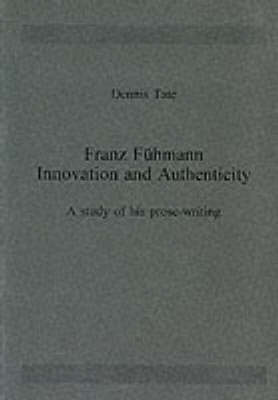Amsterdamer Publikationen zur Sprache und Literatur
1 primary work
Book 117
This is the first full-length study of the life and works of Franz Fuhmann (1922-1984) to be published in English. It provides a complete reassessment of his importance as a prose-writer, informed by the extensive corpus of Fuhmann's writing which has only appeared posthumously or is now accessible in the archives of the Akademie der Kunste in East Berlin.
Dennis Tate argues that, from the middle 1950s onwards, Fuhmann's prose writing is both stylistically innovative and committed to the authentic representation of his experience, thereby challenging the conventional wisdom that little writing of international significance could be produced in the ideological context of the GDR until Honecker introduced his `no taboos' cultural policy in 1971. Fuhmann's widely praised later texts (ranging from the autobiographical Zweiundzwanzig Tage oder Die Halfte des Lebens and Vor Feuerschlunden to mythical and satirical short stories such as `Marsyas' and `Drei nackte Manner') can now be seen as the culmination of an impressive creative development rather than as the result of a late conversion to literary truthfulness.
The volume will be of interest to students and teachers of post-1945 German literature as well as to general readers aware of the vitality of Central European culture throughout the period of East-West ideological division.
Dennis Tate argues that, from the middle 1950s onwards, Fuhmann's prose writing is both stylistically innovative and committed to the authentic representation of his experience, thereby challenging the conventional wisdom that little writing of international significance could be produced in the ideological context of the GDR until Honecker introduced his `no taboos' cultural policy in 1971. Fuhmann's widely praised later texts (ranging from the autobiographical Zweiundzwanzig Tage oder Die Halfte des Lebens and Vor Feuerschlunden to mythical and satirical short stories such as `Marsyas' and `Drei nackte Manner') can now be seen as the culmination of an impressive creative development rather than as the result of a late conversion to literary truthfulness.
The volume will be of interest to students and teachers of post-1945 German literature as well as to general readers aware of the vitality of Central European culture throughout the period of East-West ideological division.
